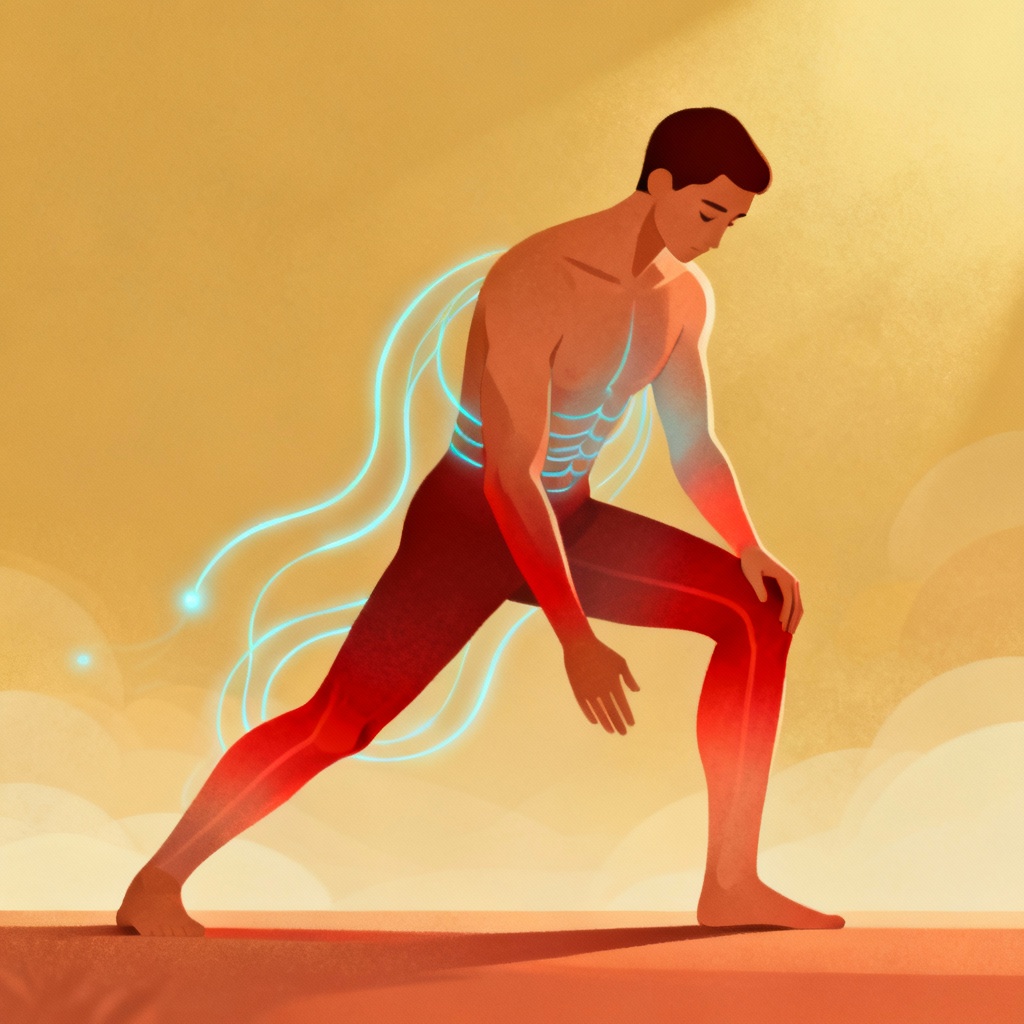Traditional Chinese Medicine (TCM) considers Qi the “commander of Blood” and Blood the “mother of Qi.” This dynamic duo forms the essential foundation for all bodily activities. When your body experiences Qi and Blood Deficiency, particularly with intense exercise, your physical endurance will inevitably suffer. Think of it like a car running low on gas and oil; it simply can’t go far or fast. This fundamental imbalance leaves you feeling constantly depleted.

How Qi and Blood Deficiency Dramatically Drains Your Exercise Stamina
Qi is the vital energy responsible for movement and function throughout your system. When you have Qi deficiency, your muscles lack the power for strong contractions. Your heart and lungs also struggle to perform efficiently, leading to reduced overall capacity.
Boost Your Energy: Uncover Your Hidden Power
Even light activity leaves you easily breathless, and your heart rate rapidly increases. You might notice excessive sweating or experience muscle soreness and weakness. This energy depletion significantly impacts your workout performance (PMID 30514067).
Blood, in TCM, is the nourishing fluid that bathes and sustains every part of your body. A deficiency means your muscles, brain, and organs don’t get enough vital nutrients or oxygen. This lack of proper sustenance manifests clearly during any physical exertion.
Nourish Your Body: Support Cellular Health
You may feel dizzy or lightheaded, and your face might appear unusually pale. Numbness or tingling in your hands and feet can occur. Concentrating on your workout becomes incredibly difficult, affecting your athletic potential.
Even if your overall Qi and Blood levels are seemingly adequate, smooth circulation is key. If Qi and Blood flow becomes obstructed, your exercise performance still takes a hit. It’s like a traffic jam in your body, preventing essential resources from reaching where they’re needed.
Improve Circulation: Optimize Resource Delivery
Recovery after workouts slows down considerably, taking much longer than it should. You might experience localized aches and pains or persistent muscle stiffness. Optimal flow is crucial for peak physical output and quick rebound. Learn more about the intricate relationship between Qi and Blood here.
Uncovering Common Qi and Blood Deficiency Types & Their Workout Woes
Heart Qi deficiency weakens the heart’s pumping ability, impacting blood circulation. Your heart governs the blood vessels, so a weak heart directly affects your stamina. This manifests as heart palpitations or chest tightness during exercise.
Strengthen Your Core: Enhance Cardiac Rhythm
You’ll feel short of breath and easily fatigued, even with minimal exertion. Crucially, your heart rate takes much longer to return to normal after physical activity. Formulas like Sheng Mai San aim to invigorate Heart Qi.
The Lungs govern Qi and control your breathing, playing a critical role in oxygen intake. Lung Qi deficiency means your body struggles to absorb enough oxygen. This leads to rapid, shallow breathing during workouts.
Deepen Your Breath: Maximize Oxygen Uptake
Your voice may become weak and low, and you’ll find yourself more susceptible to colds or flu. Poor oxygenation seriously hinders your physical capacity and recovery. Bu Fei Tang helps fortify Lung Qi.
The Spleen in TCM governs your muscles and limbs, transforming food into vital energy. Spleen Qi deficiency weakens these functions, causing muscles to feel soft and lacking strength. You’ll experience heavy, tired limbs during exercise.
Energize Your Limbs: Fuel Muscle Vigor
Feeling fatigued easily is a hallmark, often accompanied by a poor appetite. Your body struggles to convert nutrients effectively into usable energy for your muscles. Si Jun Zi Tang is often used to strengthen Spleen Qi and energy.

Kidney Qi forms the fundamental root for your bones and marrow, essential for robust physical endurance. When Kidney Qi is deficient, this foundation becomes unstable. You’ll feel significant weakness and soreness in your lower back and knees.
Fortify Your Foundation: Build Lasting Resilience
Your exercise endurance will be extremely poor, and recovery after physical activity will be prolonged. The deep reserves needed for sustained effort are simply not there. Jin Gui Shen Qi Wan is a classic formula for warming and invigorating Kidney Qi. Discover more Kidney Yang tonic foods for endurance.
General Blood deficiency means your entire body lacks sufficient nourishing fluids. This directly impacts the supply of essential nutrients to your tissues and organs. During exercise, this can lead to pronounced symptoms.
Replenish Your Reserves: Boost Vitality
You might experience dizziness, blurry vision, or a dull, pale complexion. Your fingernails may appear unusually white, and for women, menstrual flow might be light. Si Wu Tang is a renowned formula for nourishing and enriching the blood.
Effectively Boosting Your Stamina: Smart TCM Approaches
TCM offers specific herbal formulas tailored to different deficiency patterns. For instance, Bu Zhong Yi Qi Tang or Sheng Mai San address Qi deficiency. Dang Gui Bu Xue Tang or Ba Zhen Tang are options for blood deficiency.
Target Your Needs: Personalized Herbal Support
If you’re dealing with both Qi and Blood deficiency, Ten Full Great Tonifying Decoction (Shi Quan Da Bu Tang) is a comprehensive choice. Consulting a practitioner ensures the right remedy for your unique situation.
Diet plays a pivotal role in restoring balance. Red dates and longan fruits are excellent for enriching blood. Yams and lotus seeds help strengthen the Spleen and improve digestion.
Fuel Your Progress: Smart Dietary Choices
Walnuts and black sesame seeds nourish the Kidneys, while beef and lamb provide robust Qi and Blood replenishment. Incorporate these foods before and after workouts, but avoid overconsumption. Explore additional blood-tonic foods for enhanced performance.
Acupressure or acupuncture on specific points can significantly improve energy and endurance. “Guanyuan” (CV4) and “Qihai” (CV6) strengthen primal Qi. “Zusanli” (ST36) invigorates the Spleen and Stomach.
Activate Your Points: Unlock Body’s Healing
“Shenshu” (BL23) and “Mingmen” (GV4) support Kidney Qi, while “Danzhong” (CV17) and “Neiguan” (PC6) regulate heart and lung functions. Daily massage or moxibustion on these points can notably enhance athletic stamina.
When dealing with Qi and Blood Deficiency, intense, exhaustive exercise is generally not advised. Instead, choose gentle, restorative physical activities. Practices like Tai Chi, Ba Duan Jin (Eight Brocades Qigong), or slow walking are ideal.
Move Gently: Cultivate Sustainable Energy
The goal is to induce a slight sweat without feeling fatigued or depleted afterward. Gentle movement helps circulate Qi and Blood without overtaxing your already compromised system (PMID 33816158).
Lifestyle adjustments are fundamental for building and maintaining healthy Qi and Blood. Ensure you get ample sleep, allowing your body sufficient time to restore its vital substances. Avoid chronic late nights, which can severely deplete energy. Addressing issues related to Qi and Blood Deficiency is crucial for long-term well-being.
Balance Your Life: Support Natural Restoration
Maintain a cheerful disposition, as emotional well-being positively influences Qi and Blood circulation. Spend time outdoors to absorb sunlight; this naturally boosts your Yang energy. These simple habits are incredibly impactful for your overall vitality.
Ultimately, abundant Qi and Blood are the cornerstone of impressive exercise endurance. By thoughtfully addressing Qi and Blood Deficiency, which often manifests as low energy reserves, poor circulation, overall fatigue, muscle weakness, pale complexion, dizziness, shortness of breath, and slow recovery, through TCM approaches, you not only elevate athletic performance but also fortify your entire health system. Remember the ancient wisdom: “When upright Qi resides within, no evil can invade.” Individuals with robust Qi and Blood naturally possess both strong physical capabilities and powerful immunity (PMID 35154371).
References
Ready for a Quick Recharge? Your 3-Second Self-Test & 30-Second Fix!
If you suspect Qi and Blood Deficiency is holding you back, these instant checks and actions can get you started:
- If you constantly feel tired and lack energy:
3-Second Test: Check your tongue – is it notably pale with faint teeth marks around the edges?
30-Second Fix: Immediately try 5 deep, slow abdominal breaths, imagining warm energy flowing to your core. - If you get dizzy or lightheaded easily during activity:
3-Second Test: Look at your lower eyelids – are they unusually pale or lacking healthy redness?
30-Second Fix: Immediately sip a small cup of warm water steeped with a thin slice of fresh ginger and a few organic red dates. - If your muscles feel heavy and sore after minimal exercise:
3-Second Test: Gently press your calves with your thumb – do they feel soft and easily dented, leaving an impression?
30-Second Fix: Immediately gently massage your inner calves (the area above your ankle bone along the shin) for 30 seconds on each side.
Medical Disclaimer:This article is for educational use only and is not a substitute for professional medical advice.